Award-Winning Chicago Personal Injury Lawyer - Securing Justice
for Illinois Injury Victims - Over $450 Million Recovered
At Rosenfeld Injury Lawyers, our Chicago truck accident lawyer team has built a reputation for representing people whose lives were turned upside down by reckless truck drivers and negligent trucking companies.
We have the experience to handle the most complex commercial trucking cases, whether they involve multi-vehicle pileups on the Dan Ryan or catastrophic underride crashes near the intermodal yards in Cicero.
Our team has secured millions of dollars in verdicts and settlements for clients injured in semi-truck accidents, and we approach every case with the same commitment to recover maximum compensation so our clients can rebuild their lives. Contact us for a free consultation today!
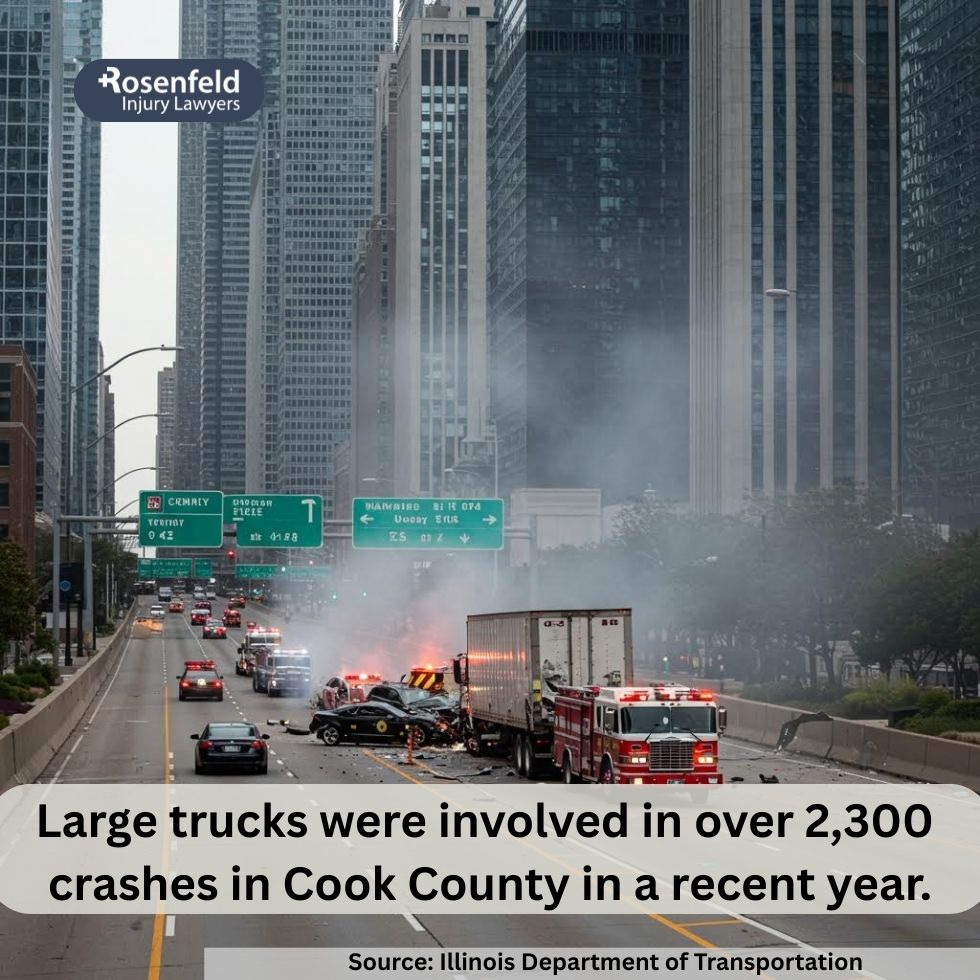
Over the years, our Chicago truck accident lawyers have recovered significant settlements and verdicts for clients injured in serious crashes. Each case tells the story of how negligent trucking companies put profit over safety, and how our team fought to secure justice for victims and their families.
When families in Chicago are searching for the best truck accident lawyers, they turn to Rosenfeld Injury Lawyers because of our proven results, our recognition by respected legal organizations, and our commitment to clients. Over the past 25 years, we have recovered more than $450 million in verdicts and settlements, including life-changing outcomes for victims of truck crashes.
Our work has earned us recognition from leading industry groups, including:
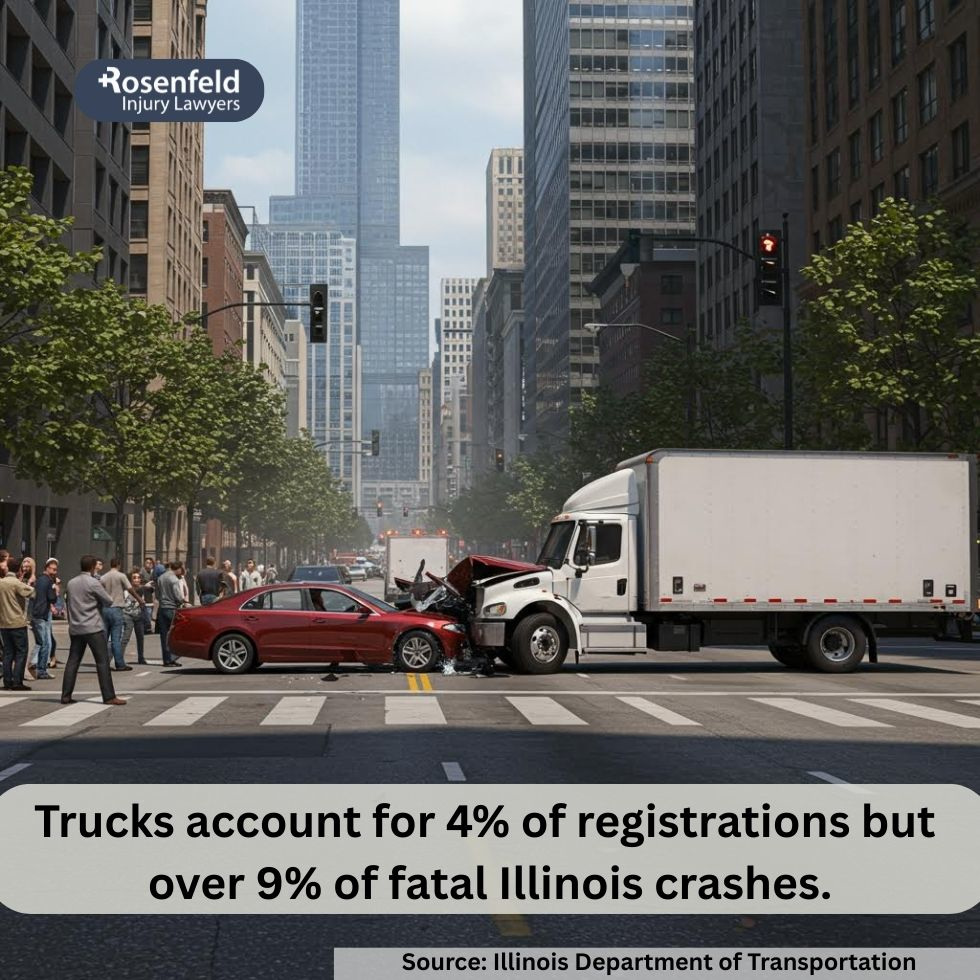
Our Chicago truck accident lawyers have represented clients in nearly every type of trucking crash imaginable, including:
Liability in a truck crash often starts with the company name on the door. Our team is experienced in handling claims involving the major national carriers and logistics fleets that dominate Chicago’s interstates,such as:
These corporations often use aggressive legal teams and rapid-response investigators to minimize their payout. We know their tactics and how to counter them.
Every truck accident has a story behind it, and more often than not, it involves negligence. Our Chicago truck accident lawyers have seen the same patterns of misconduct and unsafe practices across countless cases. The most common causes include:
By uncovering the root cause of a truck crash, we are able to hold the right parties accountable and pursue maximum compensation for our clients.
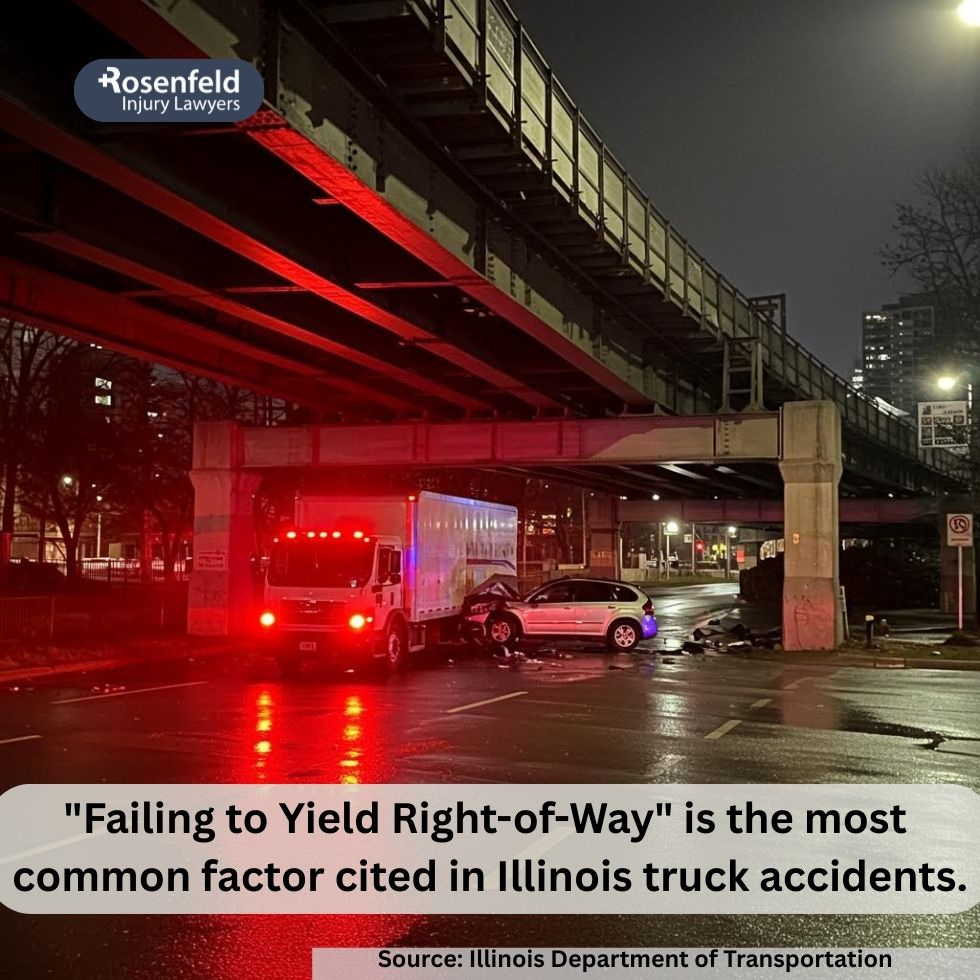
Accidents involving large trucks often cause serious injuries, such as:
Many victims are transported to Level I trauma centers in Chicago such as Stroger Hospital, Northwestern Memorial, or UChicago Medicine, depending on proximity to the crash location and severity of the injuries.
Our Chicago truck accident lawyers work to recover the full range of damages available under Illinois law so our clients can move forward with security and stability. The damages awarded after a serious truck wreck often include:
Truck accident settlements and verdicts in Chicago vary widely, depending on the facts of each case. The average payout is $4,738,813, while the median is $1,000,000. Reported recoveries range from as little as $2,961 to as much as $43,825,000.
These numbers illustrate how dramatically outcomes can differ. The value of a case often depends on:
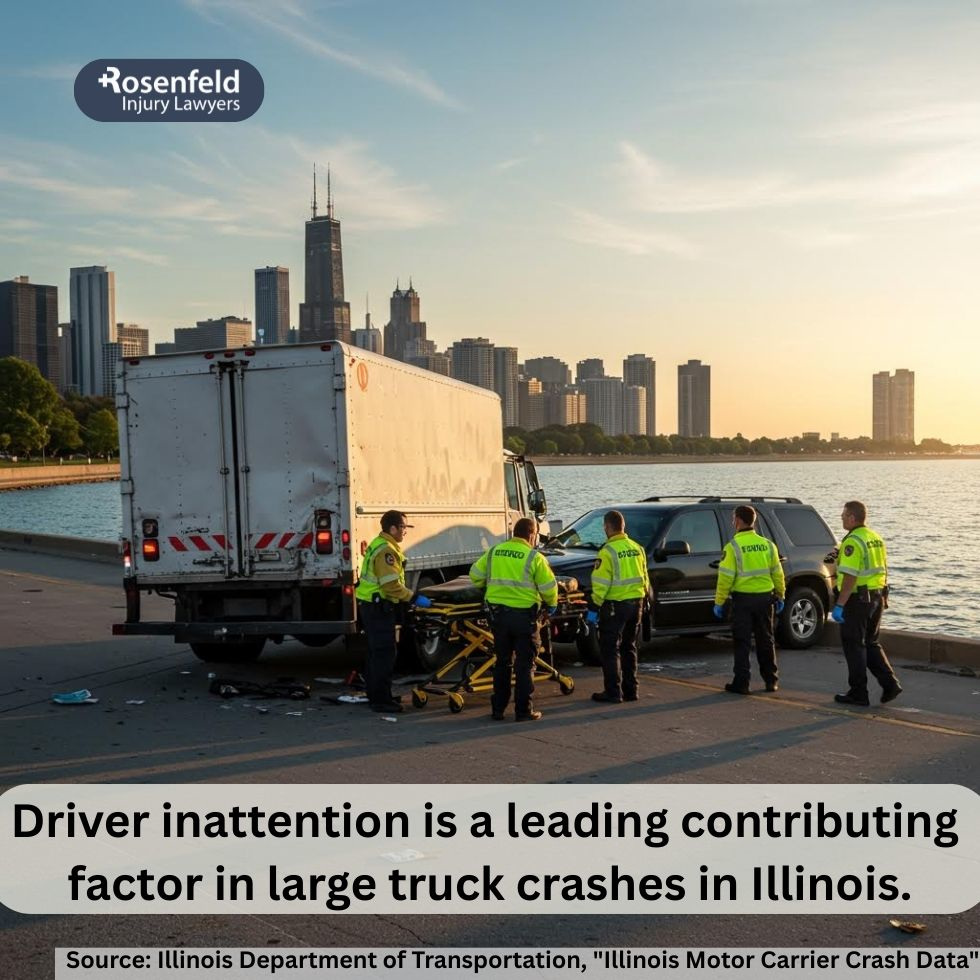
$10.9 Million Settlement – Wrongful Death of Illinois State Trooper
An Illinois State Trooper was parked on the shoulder of I-294 when a semi-truck drifted out of its lane and rear-ended his squad car. The impact pushed the vehicle nearly a quarter mile down the road before it caught fire, trapping him inside. He suffered fatal burns, and his estate brought a wrongful death lawsuit against the trucking company, its driver, and related entities. The case revealed that the driver had been on duty far longer than federal regulations allow and had falsified his logbooks. Before trial, the parties reached a settlement compensating the trooper’s widow for loss of consortium, emotional anguish, and survival damages.
$61.8 Million Jury Verdict – Fatal Dump Truck Crash on the Dan Ryan Expressway
A dump truck hauling an excessively heavy load collided with a van carrying city workers on the Dan Ryan Expressway. The impact crushed the van, killing two passengers instantly and leaving others catastrophically injured. One survivor suffered a spinal fracture and was rendered quadriplegic, requiring over $20 million in projected future medical costs. Another lost mobility but retained cognitive function, requiring lifelong care. The jury awarded $61.8 million, including damages for future medical care, disfigurement, disability, pain and suffering, and loss of society for surviving family members.
$43.8 Million Jury Verdict – Rear-End Tractor Trailer Accident
A nurse in her early 50s was stopped at an intersection in Chesterton when a tractor-trailer slammed into her car. The crash caused a fractured neck, permanent spinal cord damage, and incomplete tetraplegia. She required multiple surgeries, inpatient rehabilitation, and ongoing pain management. The jury heard testimony from medical experts that she would need lifelong treatment, including possible future surgeries and therapy. Her husband also brought a claim for loss of consortium. After weeks of trial, the jury returned a verdict covering medical bills, future care, pain and suffering, disability, emotional distress, and loss of a normal life.
$22.6 Million Jury Verdict – Rear-End Crash Leading to Permanent Disability
A woman and her daughter were rear-ended on Interstate 80 by a steel hauler. The crash caused her permanent paraplegia due to fractures in her thoracic spine, along with multiple other injuries. Her daughter sustained minor injuries and was released from the hospital, but the mother required long-term inpatient care and adaptive assistance for the rest of her life. At trial, expert witnesses testified about her shortened life expectancy and inability to return to work. The jury awarded damages for medical costs, pain and suffering, disfigurement, loss of a normal life, and her husband’s derivative claims for loss of consortium and household services.
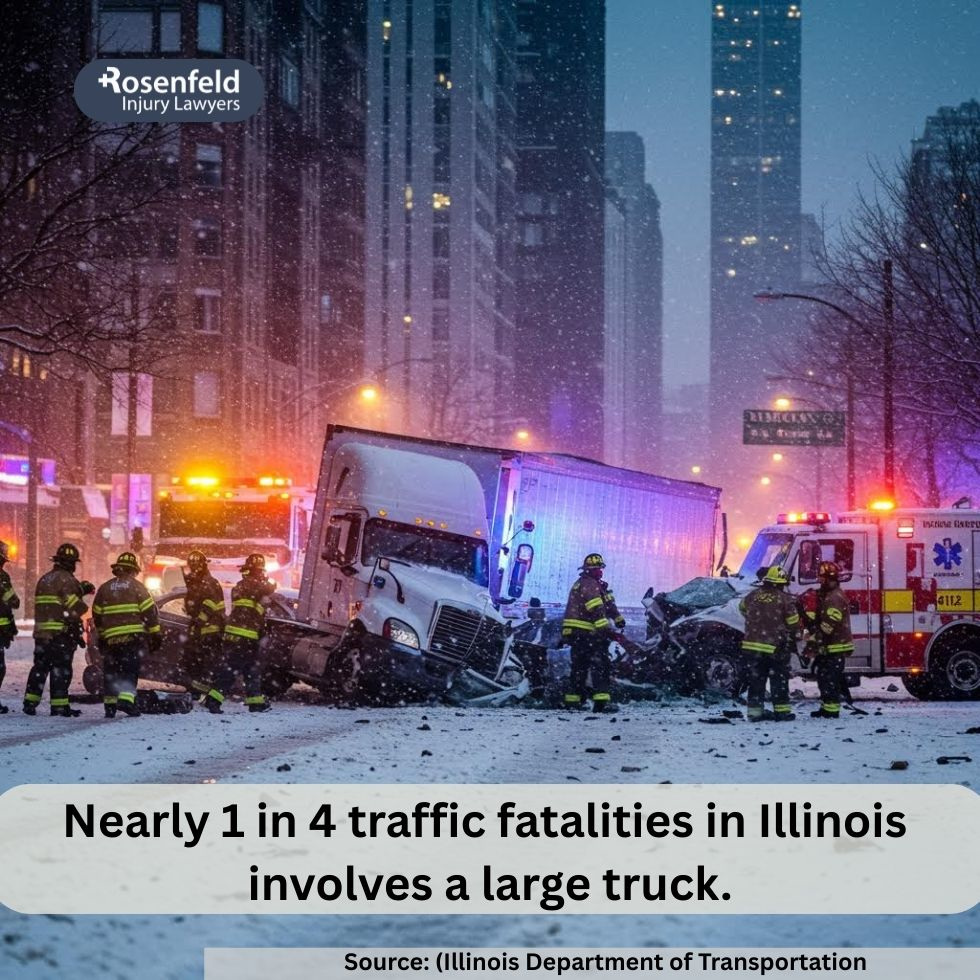
Truck accident cases are far more complex than ordinary car crash claims. These cases frequently involve:
Our firm has the resources to preserve crucial evidence like black box data and driver logbooks, work with accident reconstruction experts, and push cases to trial when settlement offers are inadequate. We are familiar with the tactics trucking companies use, and we know how to overcome them.
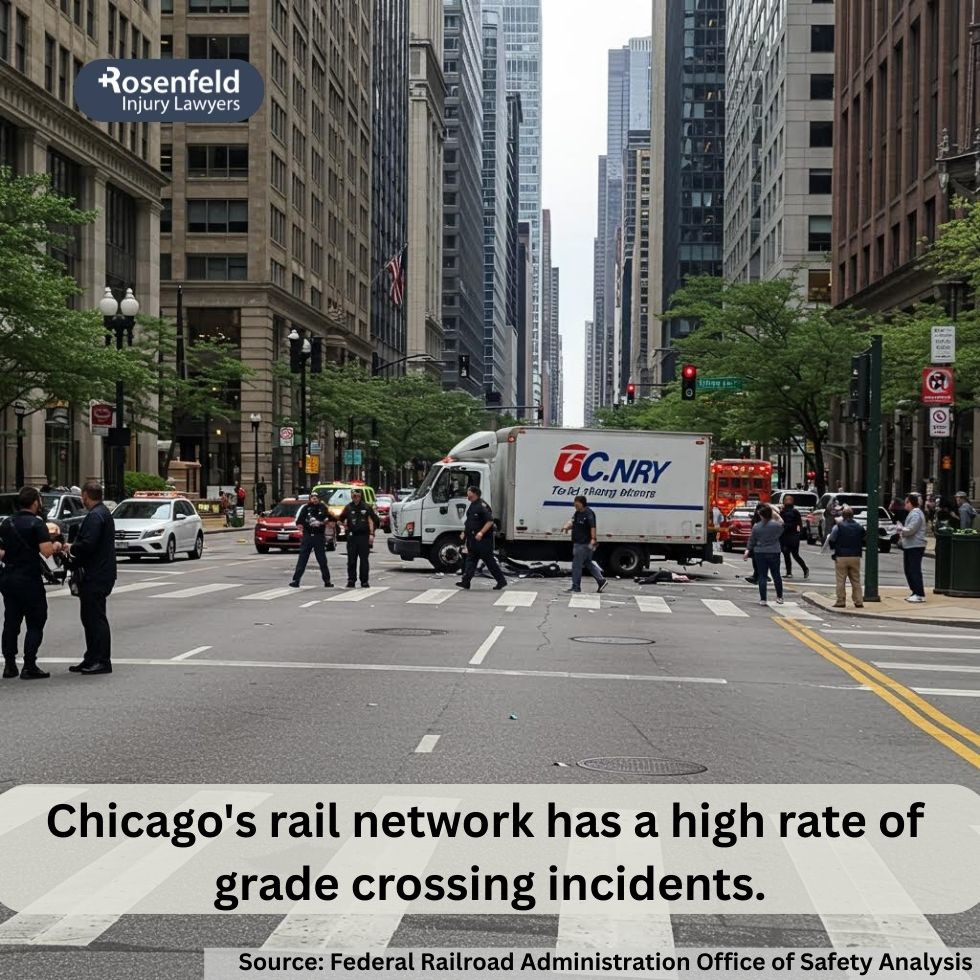
Truck accident statistics from IDOT crash reports show that tractor-trailers, single-unit trucks, and other commercial vehicles were involved in over 6,400 crashes in 2023. Out of these, more than 1,600 caused injuries, and dozens were fatal.
There were 2,278 crashes involving tractor-trailers hauling semi-trailers. Of these, 26 crashes were fatal, and more than 2,000 resulted in injuries. Tractors not hauling trailers accounted for 288 crashes. Even without a trailer, these vehicles are extremely heavy and difficult to maneuver. The report shows that 3 of these crashes were fatal, and 255 caused injuries.
Single-unit trucks, such as box trucks, garbage trucks, and delivery vehicles, were involved in 3,427 crashes across Chicago. Alarmingly, they caused 124 fatalities — the highest death toll of any truck category — and more than 3,000 injury crashes.
Though less common, 439 crashes involved single-unit trucks pulling trailers. These collisions led to 20 fatalities and nearly 400 injury crashes. Proportionally, these were among the deadliest types of accidents involving large commercial trucks in Chicago. Improperly secured trailers or unsafe maneuvering often contribute to these tragic outcomes.
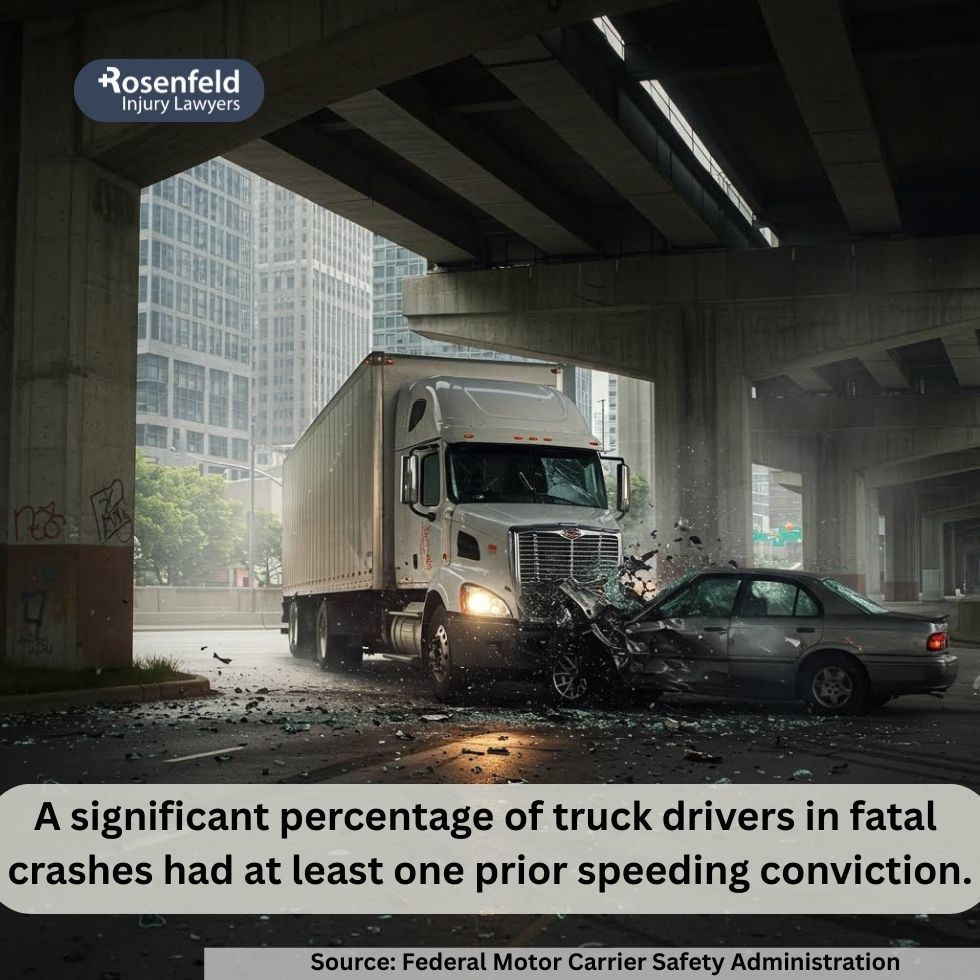
The most common locations for truck accidents in Chicago cluster around major highways and the massive logistics hubs that feed them:
The trucking industry nationwide is governed by the Federal Motor Carrier Safety Regulations (FMCSR, 49 C.F.R. Parts 350–399). These rules cover everything from driver qualifications and required medical exams to limits on hours of service designed to prevent fatigue. They also mandate regular inspections, maintenance, and proper recordkeeping for both drivers and carriers.
The Motor Carrier Act of 1980 further expanded federal oversight of interstate trucking operations, making compliance a critical issue in most cases involving commercial truck drivers.
At the state level, several statutes play a role in truck accident litigation. The Illinois Vehicle Code (625 ILCS 5/) governs safe operation of vehicles, including commercial trucks, on our roadways. The Illinois Joint Tortfeasor Contribution Act (740 ILCS 100/) allows fault to be shared among multiple negligent parties; a frequent scenario in truck cases involving drivers, employers, and cargo contractors.
In some situations, product liability statutes (735 ILCS 5/2-21) may apply if a defective truck part contributed to the crash. And when the victim is an employee injured on the job, the Illinois Workers’ Compensation Act (820 ILCS 305) provides another avenue for recovery.
On a local level, Chicago has its own ordinances (Chapter 9-72) regulating truck size, weight, and permissible routes through city streets. Violations of these municipal rules can strengthen a victim’s case by showing a pattern of negligence.
Trucking safety in Chicago is enforced by the Federal Motor Carrier Safety Administration (FMCSA) and investigated in serious crash cases by agencies such as the National Transportation Safety Board (NTSB) and the Illinois State Police (ISP).
Finally, Illinois courts have long recognized employer liability for the acts of truck drivers. In Van Horne v. Muller, 185 Ill. 2d 299 (1998), the Illinois Supreme Court reaffirmed the doctrine of respondeat superior, holding that if a truck driver causes a crash while acting within the scope of employment, the trucking company can be held directly responsible. This precedent is vital in ensuring companies, not just individual drivers, are accountable for the harm caused.
Together, these layers of law provide the framework for truck accident claims in Chicago. By combining federal safety rules, state statutes, local ordinances, and case law, we are able to build strong, evidence-backed cases that stand up against the biggest trucking companies and their insurers.
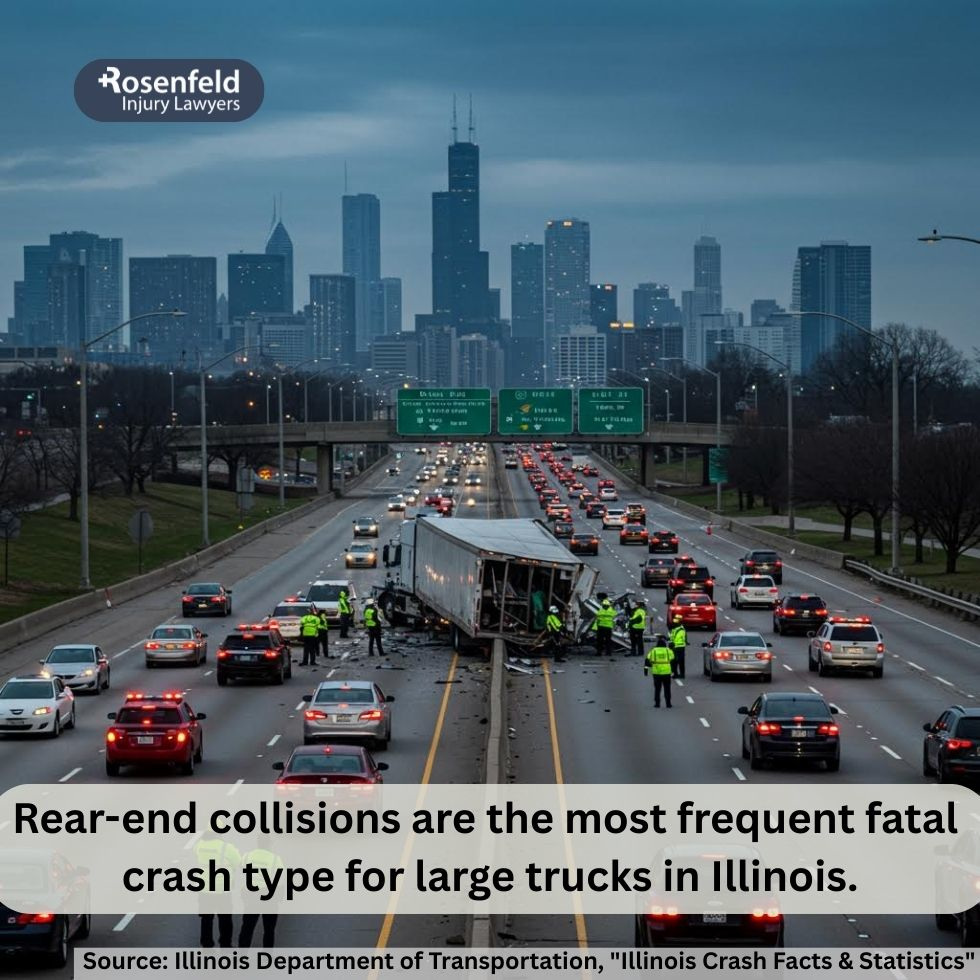
Under Illinois law, victims generally have two years from the date of the crash to file a personal injury lawsuit. This deadline is set by 735 ILCS 5/13-202, which governs claims for bodily injury caused by negligence.
There are, however, important exceptions. In wrongful death cases, the two-year clock begins on the date of death rather than the date of the accident. For injuries that do not immediately appear — such as traumatic brain injuries or internal organ damage — the discovery rule allows victims to file within two years of the time they knew or reasonably should have known about the injury.
Minors also benefit from tolling rules, which pause the statute of limitations until they reach adulthood, giving them two years from their 18th birthday to bring a claim.
Determining liability in a truck accident is rarely straightforward. Unlike a simple auto accident, commercial trucking cases often involve several parties whose negligence may have contributed to the crash. Our job as Chicago truck accident lawyers is to identify all potentially liable parties, which can include:
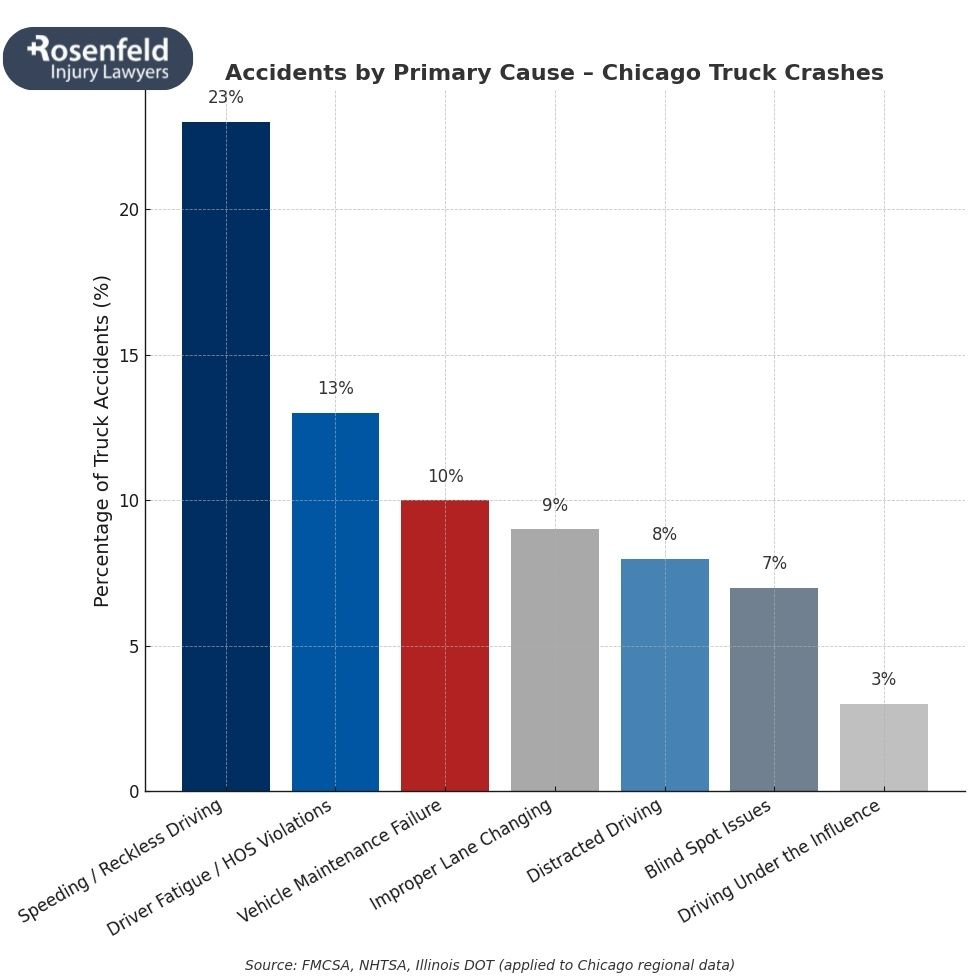
When trucking companies and their insurers are sued after a serious crash, they rarely accept responsibility without a fight. Instead, their lawyers often rely on well-worn defenses designed to limit liability or reduce the value of a claim, such as:
Illinois follows a modified comparative negligence rule (735 ILCS 5/2-1116), which means victims can still recover damages if they are less than 50% at fault for the crash. Trucking companies often try to shift blame onto injured drivers or pedestrians by arguing they contributed to the accident. We push back by reconstructing the crash, presenting witness testimony, and showing juries exactly how the trucking company’s conduct caused the wreck.
Defendants sometimes argue that the crash was unavoidable because of a sudden emergency, such as a patch of ice or a car cutting in front of the truck. While weather or traffic can complicate conditions, we show that professional drivers are trained — and required by federal regulations — to adjust their driving to account for foreseeable hazards.
Another common argument is that a mechanical failure with the truck involved, such as a blown tire or brake defect, caused the crash, and that the company could not have prevented it. Through maintenance logs, inspection records, and expert review, we often prove that these so-called “unexpected” failures were the result of poor upkeep or ignored safety checks.
Some carriers try to avoid liability by claiming the driver was an independent contractor rather than an employee. Illinois courts, including in Van Horne v. Muller, have reaffirmed that trucking companies cannot simply contract away their responsibility when they exercise control over drivers and benefit from their work.
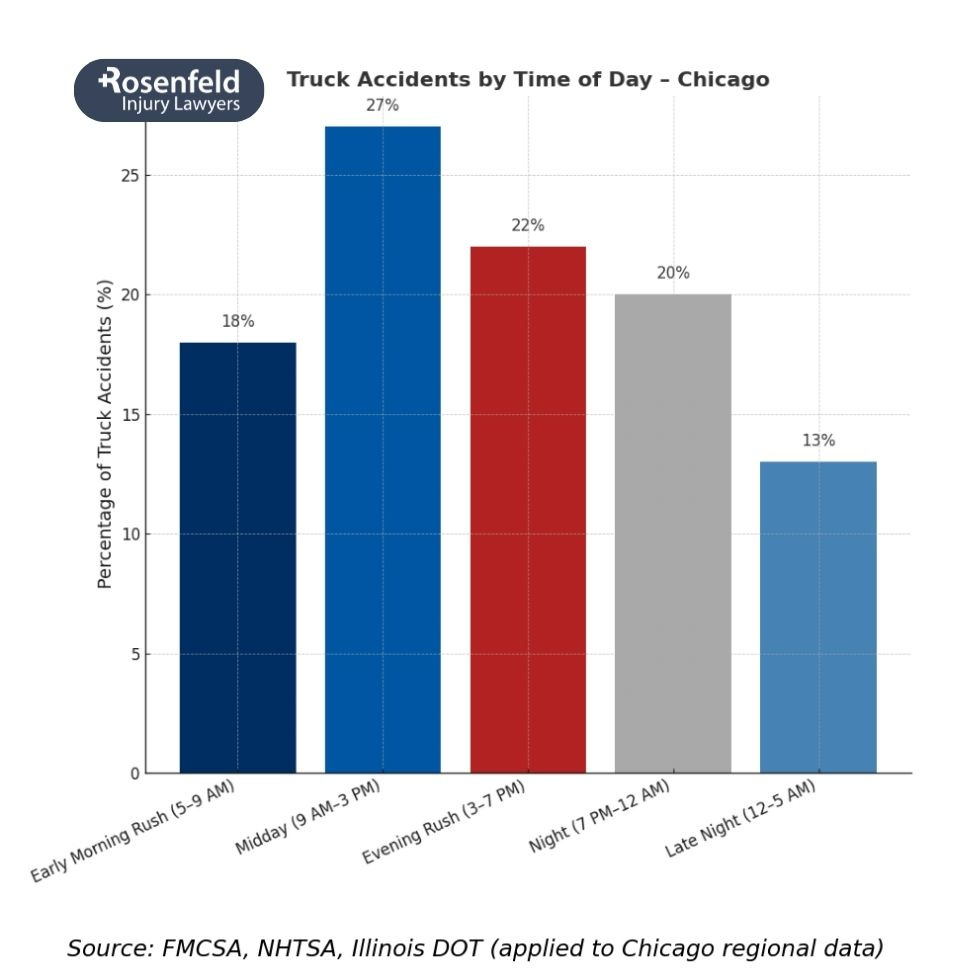
The hours and days after a truck accident are often overwhelming, but the actions victims take during this time can make a major difference in the outcome of their claim. Over the years, our Chicago truck accident lawyers have guided clients through the process of preserving evidence and protecting their rights. Some of the most important steps include:
Every truck crash should be reported immediately to law enforcement. In Chicago, accident reports are filed with the Chicago Police Department and recorded with the Illinois Department of Transportation. These reports provide critical documentation for your claim.
Photographs of the crash scene, vehicle damage, skid marks, and road conditions can be invaluable. Many trucks are also equipped with electronic control modules — commonly known as “black boxes” — that record speed, braking, and driver behavior. Securing this data early can make or break a case.
Even if injuries seem minor at first, getting evaluated by a doctor is essential. Internal bleeding, brain trauma, and spinal injuries often do not show symptoms right away. Medical records also create a paper trail that ties injuries directly to the crash.
Insurance companies often contact victims quickly, asking for recorded statements or offering lowball settlements. We strongly advise against speaking with them directly. Their goal is to protect their bottom line, not to fairly compensate you.
Because trucking companies are required to keep certain records — like driver logs and maintenance files — for only a limited time, waiting too long can mean losing key evidence. By contacting an experienced attorney early, you ensure someone is working to preserve that evidence before it disappears.
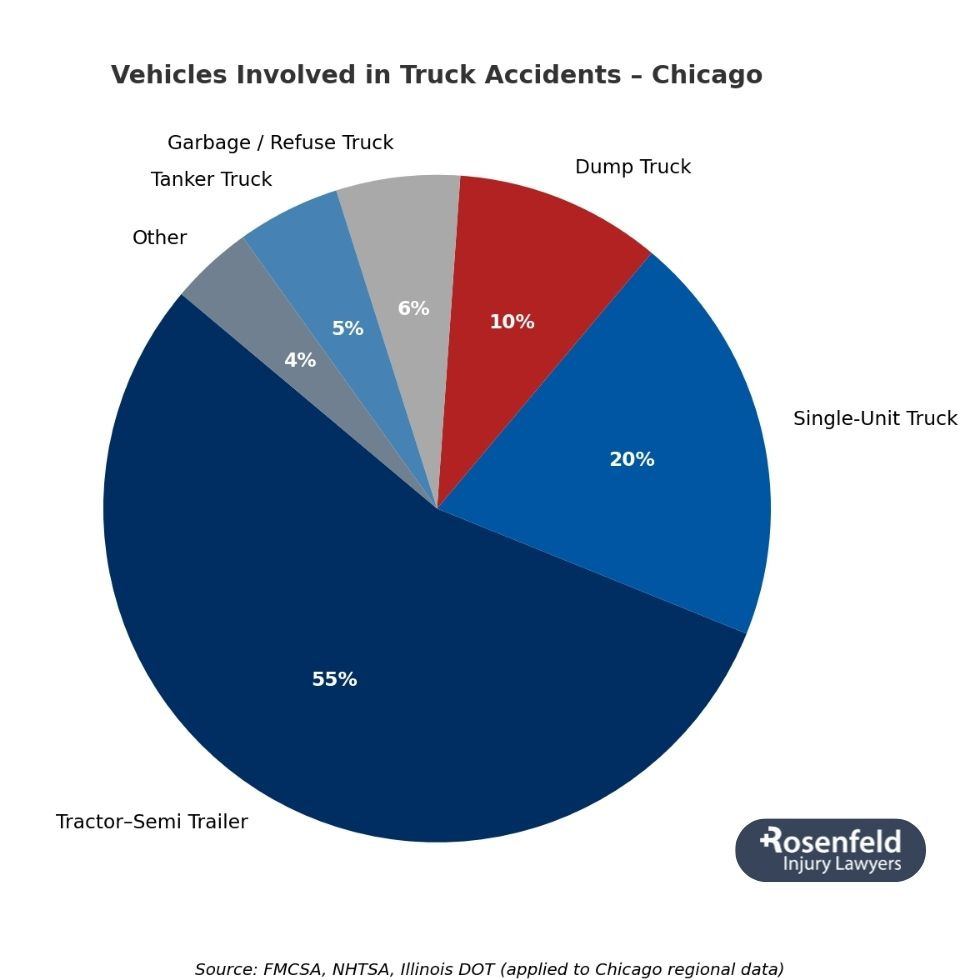
Truck accident litigation requires building a case strong enough to stand up against billion-dollar trucking companies and their insurers. Our Chicago truck accident lawyers handle every detail so our clients can focus on recovery, including:
We send investigators to the scene as soon as possible to document skid marks, vehicle debris, road conditions, and witness accounts. Preserving this evidence early is critical because trucking companies often have rapid-response teams working to protect themselves immediately after a crash.
Electronic logging devices and truck “black boxes” record valuable information such as driver hours, speed, braking, and mechanical performance before the crash. We move quickly to obtain and preserve this data before it is overwritten or destroyed.
Our firm partners with engineers and reconstruction specialists to analyze how a crash occurred. Their testimony helps juries understand what happened and why the trucking company should be held responsible.
Depending on the circumstances, cases may be filed in the Cook County Circuit Court or the U.S. District Court for the Northern District of Illinois. We are experienced in both venues and know how to navigate their unique procedures.
While many cases settle, we prepare every claim as though it will go to trial. This approach gives us leverage in negotiations and ensures we are ready to fight for our clients in court when defendants and the insurance carriers involved refuse to offer a fair settlement.
Truck accident cases are more complex because they often involve multiple defendants, federal regulations, and higher potential damages. Unlike motor vehicle accidents involving passenger vehicles, a trucking case might include the driver, their employer, a freight loader, and even a maintenance contractor. Federal rules such as the FMCSR also impose safety obligations that don’t apply to ordinary drivers, giving us additional avenues to prove negligence.
It is best not to speak with the trucking company’s insurer directly. Adjusters are trained to ask questions that can reduce or deny claims. We advise clients to let us handle all communications so they don’t risk saying something that can be used against them later.
Early settlement offers are almost always far below the true value of the claim. Truck accident injuries often require long-term care, and victims may not know the full extent of their damages for months. We carefully evaluate offers against projected medical bills, lost earnings, and other damages before advising clients whether to settle or move forward to trial.
Yes. Illinois law allows victims to bring personal injury claims for negligence when a truck driver fails to exercise reasonable care. This includes violations of traffic laws, driving while fatigued, distracted driving, or failing to inspect and maintain equipment.
We must prove four elements: duty, breach, causation, and damages. Truck drivers and companies have a duty to follow safety laws and operate responsibly. When they breach that duty — for example, by overloading cargo or ignoring Hours of Service limits — and that conduct causes injuries, they can be held legally responsible for damages.
Yes. Any accident resulting in injury, death, or property damage over $1,500 must be reported under Illinois law. In serious truck crashes, police are typically on the scene, but victims should still make sure a formal report is filed and request a copy for their records.
The strongest cases are built on black box data, driver logbooks, maintenance records, police reports, witness statements, medical records, and photographs from the scene. We also often retain experts in accident reconstruction and trucking safety to explain how the crash occurred.
Illinois follows a comparative negligence system. Victims can still recover compensation if they were less than 50% at fault, but their recovery is reduced by their percentage of responsibility. For example, someone found 20% at fault would still recover 80% of their damages.
Every case is different. Some cases are resolved in months through negotiation, while others go to trial and take several years. Complex cases with multiple defendants typically take longer, especially if the defense challenges liability or damages.
The sooner the better. Critical evidence such as black box data, surveillance video, and driver logs can disappear quickly. Contacting a lawyer immediately gives us the best chance to preserve this information and strengthen your case.
We handle truck accident cases on a contingency fee basis. That means our clients pay nothing upfront and no hourly fees. We only collect if we secure a settlement or verdict in their favor, ensuring legal representation is accessible to everyone regardless of financial situation.

After a serious truck accident, the decisions you make in the days and weeks that follow can shape your recovery for the rest of your life. At Rosenfeld Injury Lawyers, we have the experience, resources, and proven track record to take on the toughest trucking cases in Cook County and throughout Illinois.
Trucking companies and their insurers move quickly to protect themselves, which is why it’s critical that you have a legal team working just as fast to protect you. Our firm offers free consultations, and we take every case on a contingency fee basis, meaning you pay nothing unless we recover compensation for you.
If you or a loved one suffered injuries in a tractor-trailer accident, don’t wait. Contact our Chicago personal injury lawyerstoday to discuss your case, preserve key evidence, and begin the process of pursuing the maximum compensation you deserve.
Our downtown office, near the Richard J. Daley Center, Dirkson United States Courthouse, and the Chicago Workers’ Compensation Commission, offers convenient access from Aurora, Joliet, and Waukegan via I-90, I-94, and I-290.
225 W Wacker Dr #1660
Chicago, IL 60606
Phone: (847) 835-8895
Albany Park | Austin | Belmont Cragin | Brighton Park | Englewood | Garfield Ridge | Irving Park | Lake View | Lincoln Park | Logan Square | Near North Side | Near West Side | New City | Portage Park | Roseland | South Lawndale | Uptown | West Englewood | West Ridge | West Town
All content undergoes thorough legal review by experienced attorneys, including Jonathan Rosenfeld. With 25 years of experience in personal injury law and over 100 years of combined legal expertise within our team, we ensure that every article is legally accurate, compliant, and reflects current legal standards.